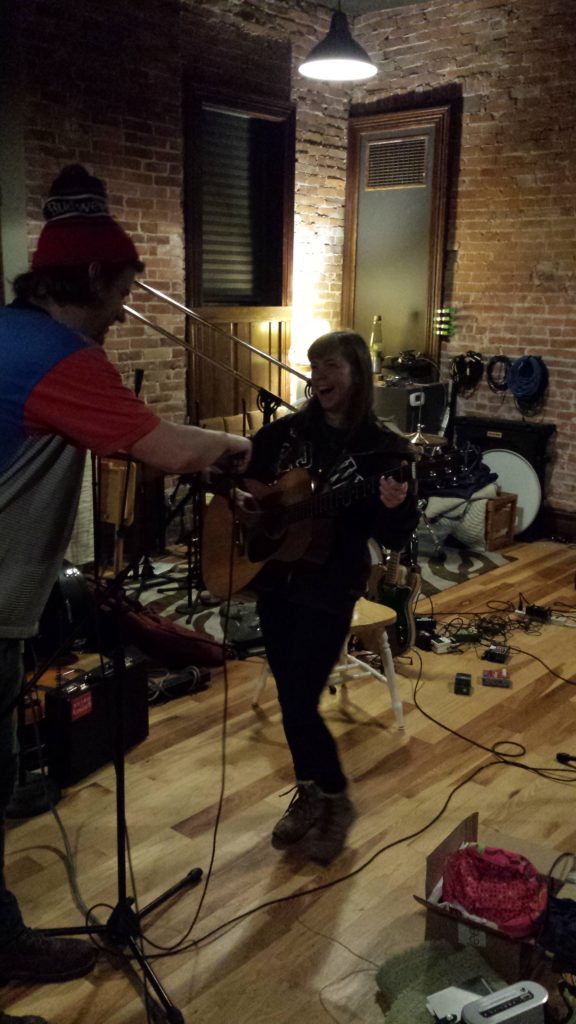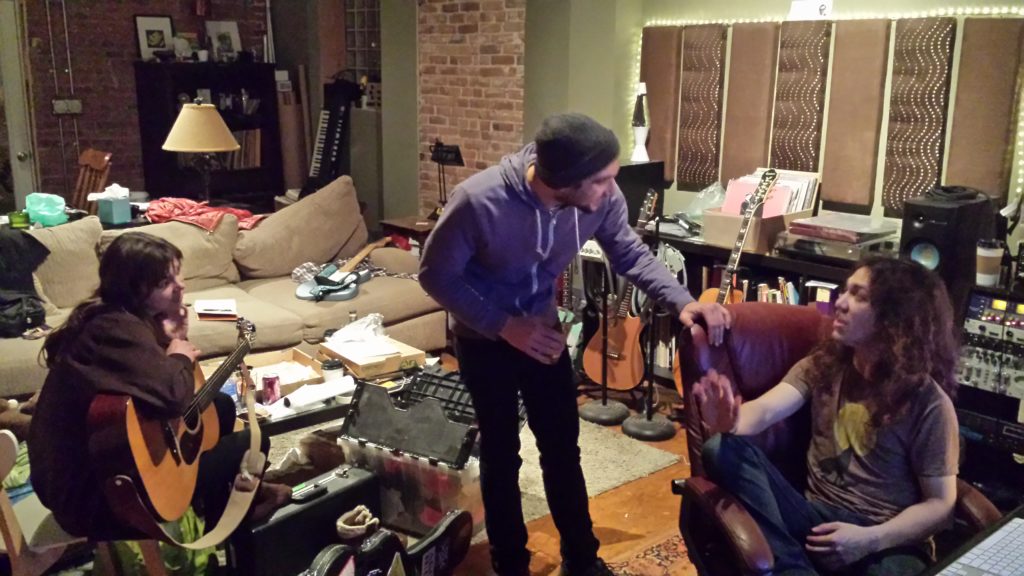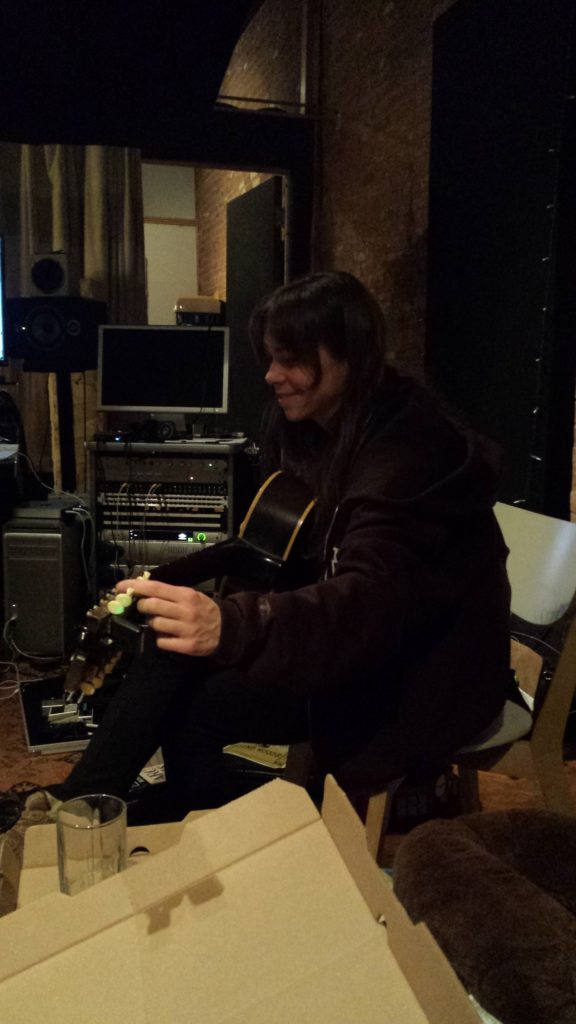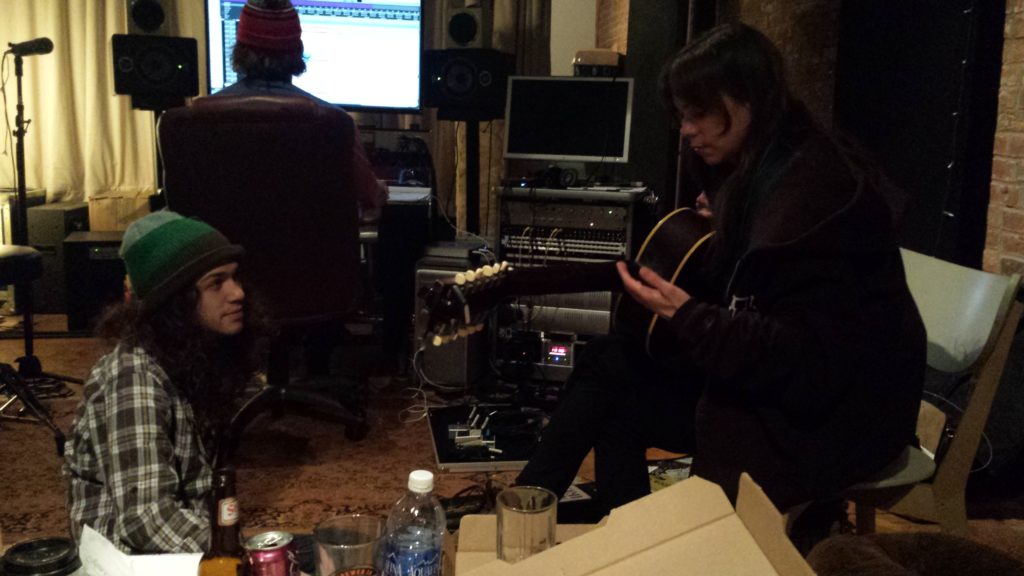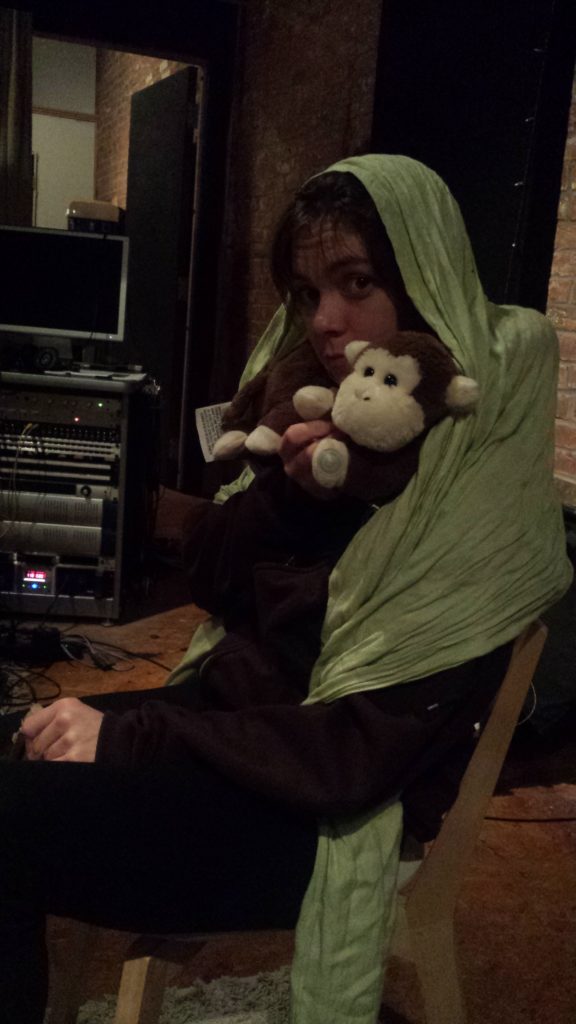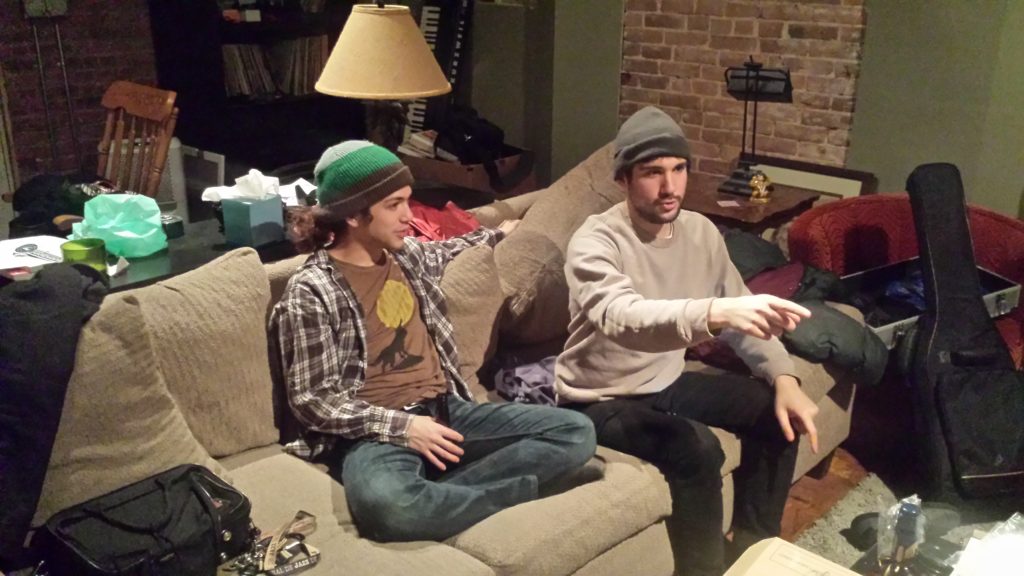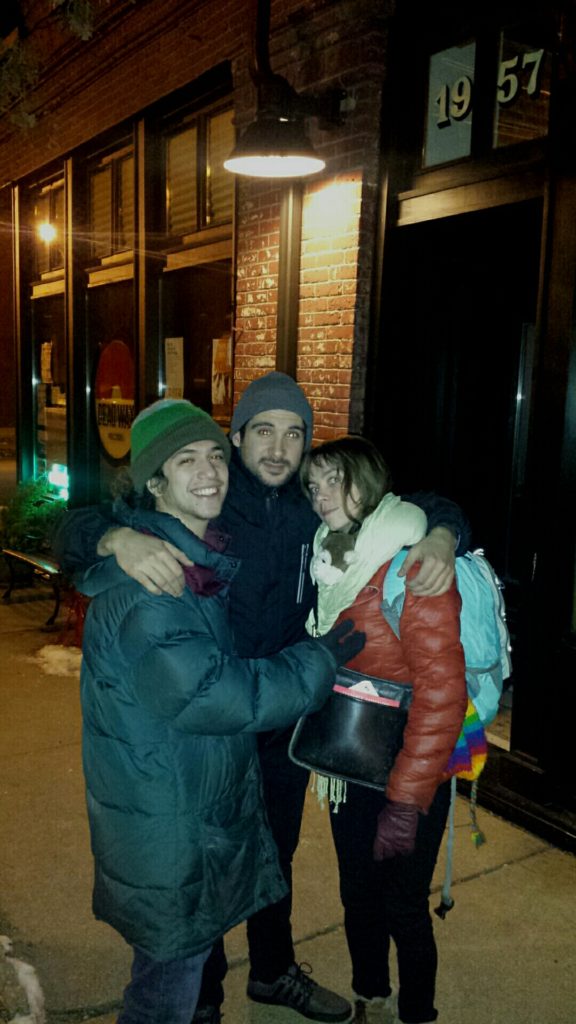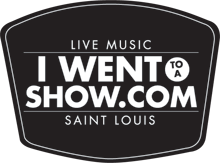[INTERVIEW] In the Studio with Arc Iris
December 12, 2016
Written and photographed by Kyle Kapper.
[Arc Iris performs on Sunday, December 18th, at Off Broadway with David Beeman and Essential Knots. Tickets are available now.]
Warm air blasts out into the winter night, carrying with it a piercing two-note guitar solo that seems to announce the witching hour like a cuckoo clock from Neil Young’s attic. Drummer Ray Belli and keyboardist Zach Tenorio Miller are on the couch while Native Sound’s David Beeman, looking like a Jason Segel/Where’s Waldo mash-up in a stocking cap crown, occupies the captain’s chair .
When the guitar quits its cry, the door to the next room opens, and bandleader Jocie Adams walks in: “Oh my God. I thought that was going to take me five hours. It wasn’t that hard.” She laughs and grabs some pizza.
It was a snowy week this past January when one of my favorite bands, Arc Iris, came to St. Louis, ostensibly to bring their dazzling stage show to St. Louis but also to record an album. The latter was a unique choice for two reasons: first, they were recording their third album six months before their second album (Moon Saloon) would drop; and second, Native Sound, located on Cherokee Street, is about 1,200 miles from their Rhode Island home.
Since Arc Iris is soon to celebrate the release of Moon Saloon here in town this Sunday, I thought it appropriate to look back on that twilight recording session from early this year when, between takes and sips of Barterhouse bourbon, the band generously offered a glimpse behind their craft. Let’s start with the Ziggy Stardust spandex-and-wings stage attire…:
Jocie: The outfits, [and] the general portrayal of the band, are intended to help people. When we started making music, it was clear that our music is a challenge for the listener. That’s great, but the presentation is meant to take people out of the space that they’re in and immediately know that something different is going to happen, to change the way you’re looking at it so you’re able to absorb it with more of a clean slate.
Kyle: St. Louis is a long walk from Providence, especially in January. What made you want to record here?
Jocie: [David Beeman’s] just a sweet guy. He invited us last-minute to do a show at his studio which was a really cool gesture, and it was beautiful. The studio itself is beautiful. The show was great, and his friends were great.
Zach: It was one of the highlights of the whole tour.
Jocie: Yeah. So we just thought, “This is a good spot. Let’s come back.”
[Arc Iris’ show the night before was co-billed with Jessica Lea Mayfield, but she was snowed in in Nashville, leading Jocie, Zach, and Ray to try out some of their newest material in front of a live, lucky audience.]
Zach: I would say pretty much the whole show was a new experience for us because it was as a trio; and then a lot of the songs, we’d never played live before. Brand new songs.
Was that liberating or frightening?
Zach: It was both. I was doing more thinking during that show than I have in a while. Like doing math problems onstage. Pushing buttons and getting all my sounds right. It’s a lot to think about.
[“Kaleidoscope,” the single from Moon Saloon, includes the haunting lyric, ‘Give the worried man a rose.’ I reference the line and ask whether they intentionally infuse social awareness into their music.]
Jocie: Yeah, I mean, the tradition of folk music is meant to speak to the times and speak to things that are changing or happening during the time, and I feel that as I’m storytelling, that’s relevant in some ways. I come from a folk tradition in terms of my songwriting. I mean, sometimes I write absurdist things. I try to write lyrics that are worth writing.
Can you give us any hints as to the themes you’re folding into your newest music?
Jocie: The idea of wanting to know more about being someone else or wanting to be someone else. The curiosity of idolatry and also from the flip side. Some of the songs are written from the other side, the confusion of being idolized. There’s more than that, too.
[As the hours grow longer, David replays tracks, and the trio critiques their work (“That guitar sounds so good in real life but needs another mic…”). The whiskey and twilight also blend for deeper one-off reflections.]
Jocie: Moving for love is a big deal.
Zach: I didn’t live anywhere. I never slept in my car, but I did live in my car.
[Jocie wraps herself in a half-monkey stuffed animal, half-neck pillow she lovingly named ‘Tour Cat’ as Ray, dead asleep just a few moments before, awakens on the couch. He stands and immediately begins critiquing the playback.]
Ray Belli: The good thing about recording [is] you can do multiple takes of something. You have the clean version, the sloppy version, the loud version, the soft version. Sometimes there’s a clear answer, and sometimes there isn’t. The funny thing is [that] whatever gets committed to the final product is what seems like what the ultimate vision was, like that’s the way it had to be; but often on records, a lot of decisions aren’t like that, you know? It’s just like, well, that’s what we got, let’s roll with it.
Zach: Totally.
As you mentioned, your shows transport the audience into a new state of mind. What’s in your own minds when you’re trying to do that?
Zach: As a kid, I was really into keyboard heroes like Keith Emerson. Guys who would stab their organs with knives.
Jocie: What?!
Zach: Keith Emerson had an organ, and he would stab it with knives, and it would sustain the notes. You should watch a video of it sometime. And he plays from behind the organ, upside-down. I wanted to do that.
Ray: This may be a little esoteric, but a friend of mine once described playing music as totally second nature because in his lifestyle day-to-day, there’s no distinction between playing music versus not playing music. He’s a full-time musician and a teacher, so he’s pretty much playing music all day, so there’s no real separation of lifestyle. Whether he’s walking to the market or teaching, he’s thinking about music. When you have something that’s so ingrained – like we’re having this conversation now, I’m not thinking about the words I’m going to say or how loudly I should speak or how expressive I should be with my eyebrows. It’s just how it happens so you can get to that place.
You guys met at a show, right?
Zach: Yeah, it was Diamond Doves – I was playing in that band – and we were opening up for the Felice Brothers. Jocie had done her solo record, Bed of Notions, at the bass player’s house and that’s where we met. I told her that I was a fan of hers because I’d seen her play before and she was awesome, and I wanted to play music together. She got a little worried when I told her that. [laughs] She’d just seen me play and she said something like, “I like to play as few notes as possible.”
Ray: And then she was converted to the cult.
Jocie, I think it’s fair to say you took a risk leaving The Low Anthem. How do you feel about that decision looking back now?
Jocie: Yeah, I wouldn’t have…it was time. It was a spiritual thing. Spiritually and musically, it was time for me to do my own thing. I needed to do it, and I’m doing it.
After the show, you mentioned your respect for your former bandmate’s songwriting.
Jocie: Ben [Knox Miller] is an excellent lyric writer.
Do you consider yourself an excellent one as well?
Jocie: I don’t know.
Zach & Ray (in unison, laughing): I do.
